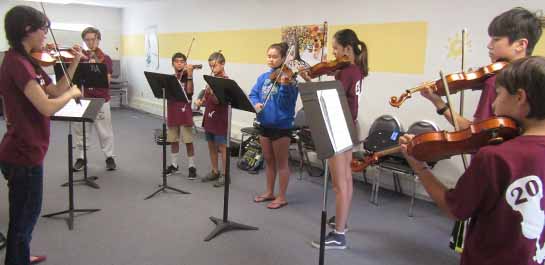This summer’s Violin Bootcamp, August 5-19 & 12-16, is now in its fifth year at Mason, providing committed intermediate and advanced violinists (and now violists!) ages 10-18 the opportunity to develop their technique, strengthen their fundamentals, and elevate their playing to the next level. Bootcamp Directors Claire Allen and Matt Richardson, along with some of the faculty, recently offered their wisdom and insights into the program in a short interview with the Academy.
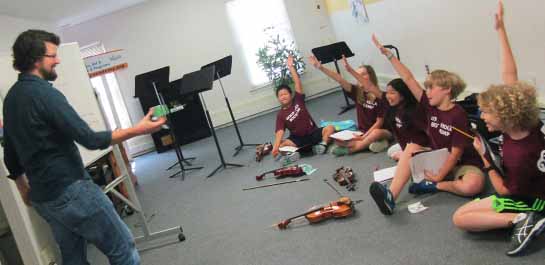
MCAA: What was your goal in creating Violin Bootcamp?
M.Richardson: When I was in middle and high school, I attended a 3-week summer strings camp in North Carolina. That program was a residential program, so we had chamber music and orchestra, but there was also a morning technique class and supervised practice time. Every year, when I would attend that program, I would learn more than I did the rest of the year combined! Now, there are a lot of good chamber and orchestra summer programs in this area, but I have never found a program that gives the other side of that experience which was so invaluable to me. In the Violin/Viola Bootcamp, we sought to recreate, and intensify this individually focused summer experience in a local setting, and the Mason Community Arts Academy is the perfect vehicle for that.
C.Allen: As a student, I vividly remember several experiences where I was sitting in orchestra, struggling to keep up and learn all the notes, and watching the students in the front of the sections who seemed to play so confidently and effortlessly. I practiced a lot, but I never quite got to the level I wanted. Much later, as a Graduate student at Peabody who had to restructure my entire fundamental technique and as a pedagogy student learning how to teach, I learned that the answers were largely structural. Our posture before we even start to hold the instrument can impact the sound. How the instrument is positioned and how the bow is held dramatically affect what the player will be able to do. These questions aren’t just for beginning players – at every level, students can benefit from doing a foundation check to ensure that they are set up properly and see the effects throughout their playing. In Bootcamp, I want to create an environment where students aren’t pressured to learn a crazy amount of notes – I want to help give them answers and solutions to improve their playing skills, and I want to create an environment that allows them to explore and make changes while being supported and encouraged.
MCAA: What has most surprised you about Violin Bootcamp?
M.Richardson: Honestly, the biggest surprise to me every year is how much the students enjoy the camp! As a professional violinist, I can obviously see the benefits of a week-long camp of intensive violin focus, but there is always a fear that while the camp will be helpful for students, it may not be terrifically enjoyable. But every time, I’m always amazed by how much the students enjoy the program, and how sad they are when it is over. Part of it is definitely the camaraderie that develops when everyone is working hard on similar goals, but it is often my experience that the students really enjoy the amount of progress that they make, and overcoming habits that have sometimes been long-term struggles in their playing.
C.Allen: The biggest surprise is the support from the wider violin community outside of the Academy here in Fairfax. Whenever we tell other teachers about Bootcamp, they love the idea and enthusiastically recommend it to their students. We’ve been very fortunate to have violin professors from several universities come in as guest clinicians, including Dr. Peter Wilson from Mason, Dr. Cora Cooper from KSU, Rebecca Henry from Peabody Preparatory/Gettysburg College, and Susanna Klein from VCU.
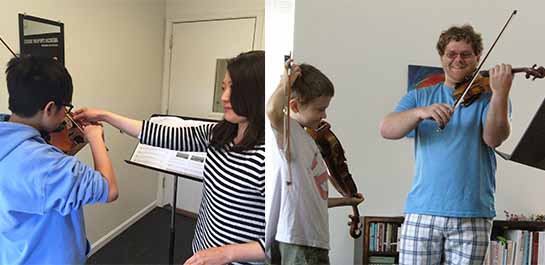
MCAA: How has Bootcamp grown and evolved over the years?
M.Richardson: When we first started the Violin Bootcamp 5 years ago, there was a feeling that we had to convince parents, students, and even other teachers of the value of our program. However, over the years, and after having a lot of successful student experiences, there has been a gradual change in expectation. Now, when our students show up for the first day of camp, they know how much they are going to learn and that they are going to have a great experience, and that changes the whole dynamic of our program!
C.Allen: The playing level has gotten higher every year, and the range of activities we can do with the students has therefore expanded as well. We tweak the schedule and classes every year based on feedback from previous participants. This year, we’re combining the fundamentals and scales classes so students can immediately integrate the principles of good posture into playing scales and arpeggios. We’ll also be creating separate tracks so that more advanced teenage students have more individual practice time, and so the younger students have more instructional time with supplemental courses.
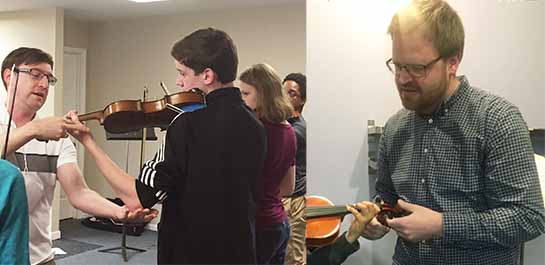
MCAA: What is one of your favorite Bootcamp moments?
M.Richardson: I have an easy favorite Bootcamp moment. In the summer of 2017, Claire Allen was working with one of her students on developing a story to accompany the piece he was working on to help him connect to it more emotionally. He came to camp the next day with a two-page typed out story in which I was the main character, which was then very dramatically performed by one of my own students during the lunch break to great applause. And for those who were there, yes, I do still have that rock sitting on my shelf in my studio! [laughs]
C.Allen: One year, one of my new private students, who needed a great deal of technical rehabilitation and whose self-confidence in her playing was extraordinarily low, came to Bootcamp. She soaked up so much in her lessons and classes, practiced diligently, and made more progress in one week than she had in the previous two months of private lessons. At the end of the week, she said with surprised pride, “I didn’t know I could sound this good!”
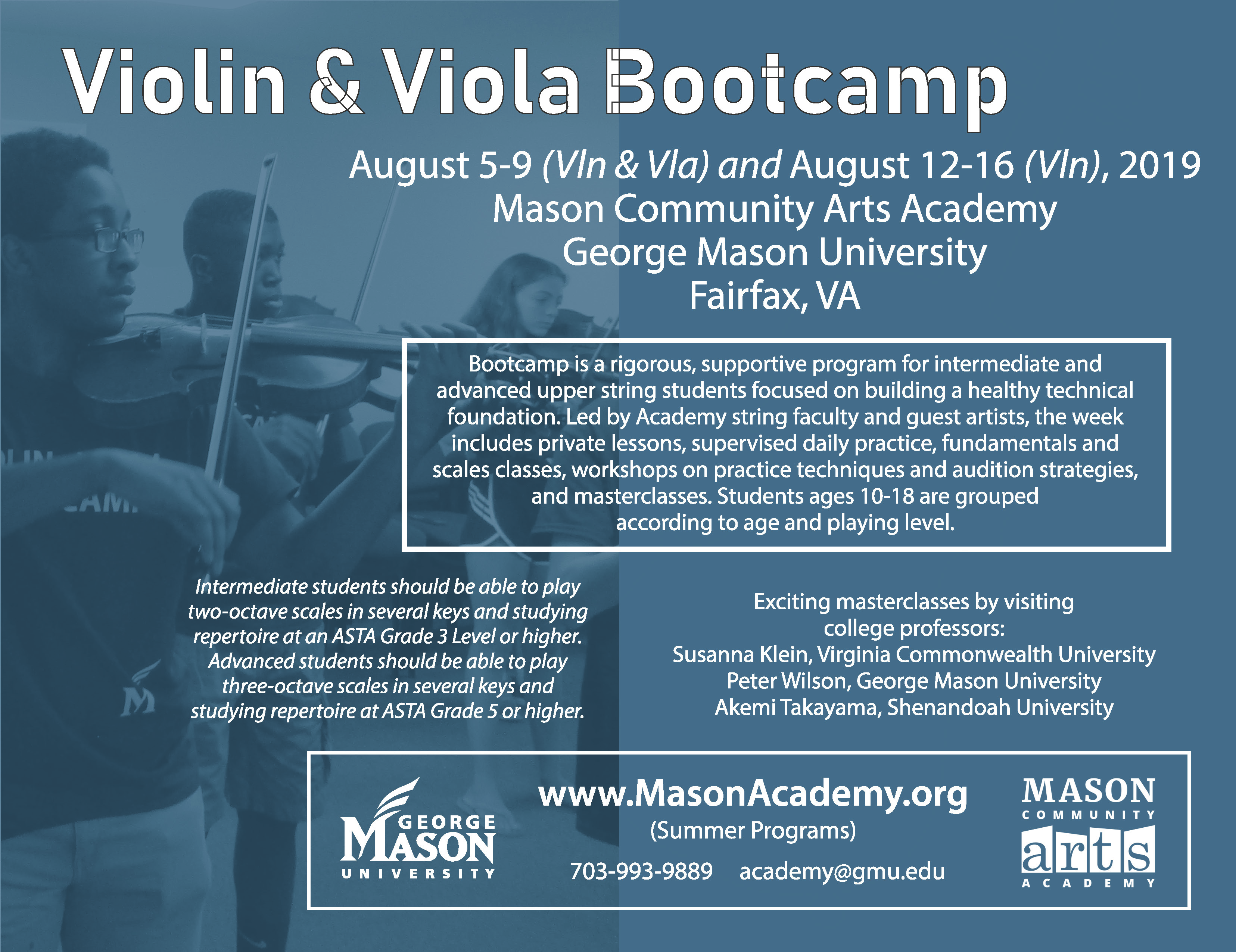
MCAA: We hear that you and some of the other faculty have some special practice tips for students that are covered – and exercised – at Bootcamp?
C. Allen: Yes! Make changes from the ground up. If the lower half of your body isn’t supporting the rest of you or your spine is compressed, playing your instrument will be harder before you play a single note.
M. Richardson: Some of the topics I cover are – Why do we squeeze? How do we stop squeezing? Why do we play with Straight 4th fingers? What is a Habit and how do you immediately break them? and Why are all scales secretly really easy?
Hyunji Lee: Regular practice with a mirror is essential to developing proper technique!
Patrick LeStrange: Always practice slowly. If you cannot play something cleanly under tempo, it is not going to happen at a fast speed!
Drew Robertson: Your metronome will never lie to you. If you trust it, you will be friends for life.
Andrew Juola: A healthy practice strategy for learning a new piece involves taking turns playing and singing/imagining the music.
With limited spaces available, and a significant number of returning students each year, don’t miss your chance to get in on the action. A short audition video is required to ensure proper placement in the program – see the program webpage for details!
DOWNLOAD FLIER (Spread the word!)

